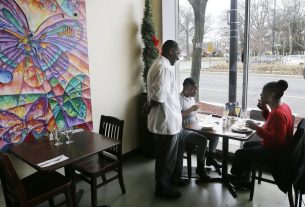Gendered social norms don’t just dictate the roles women can play in rural economies, they limit their access to the tools they need to invest in income-generating activities. Mariama, a farmer and mother of three living in the Casamance region of Senegal, knows this well. For as long as she can remember, Mariama was told that she belongs in the rice field or at home with the children. She’s heard that it isn’t a woman’s place to decide on financial or agricultural matters alone, that this is the responsibility of her husband. “It is my husband who decides what to grow each year. He is my husband, so I’m under his guardianship,” Mariama explains.
For myAgro – a social enterprise offering smallholder farmers flexible packages of seeds, fertilizer and training using an innovative mobile layaway approach – Mariama’s story is a familiar one. Indeed, gender norms underlie many of the constraints facing rural women in the three Sub-Saharan African countries where myAgro operates. But nearly a decade after launching its operations in Senegal, the company began to notice important differences in the uptake of its services amongst women there when compared to neighboring Mali. While women make up an estimated 70% of myAgro’s customers in Mali, they represent around just 25% of customers in Senegal. When myAgro partnered with CGAP and Dalberg Design to explore how they could expand the company’s outreach to Senegalese women, they weren’t surprised to learn that social norms were the number one barrier standing in their way.
To understand the norms Senegalese women face, myAgro started by listening to their communities
Importantly, the Human-Centered Design (HCD) methodologies research prioritized working with communities, aiming to not only understand women’s needs but also the beliefs held by key local stakeholders including men, religious leaders, influential women, and myAgro agents. This meant inviting the entire community to co-design alongside women farmers themselves. The research revealed that women’s financial and agricultural behaviors are influenced by three main gender norms around household decision-making, agricultural responsibilities, and financial behaviors.
Norm #1: Men should be the primary decision-makers and financial providers for the family
Interviews with women farmers and other community members revealed that decision-making over agricultural and financial matters is seen as the domain of men. Like Mariama, the community considers that husbands should have the power to grant or deny permission for their wives to use myAgro’s services. Therefore, reaching women – particularly in male-headed households – requires first reaching their husbands. While some men do allow their wives to enroll with myAgro, and in some cases even contribute payments to their wives’ layaway accounts, most prefer to sign up themselves on behalf of the household. Many also feel uncomfortable having male agents interact with their wives in their absence. This limits the number of possible contact points that male agents could have with new female clients and increases the perceived “acquisition cost.”
Men are also expected to be the primary breadwinners and cover household-related expenses. In practice, though, many women feel the need to contribute to household expenses as well, reducing the financial burden on their husbands and/or covering unmet needs. “If I have money myself, then I don’t need to bother [my husband]. I don’t have to borrow from anyone, I can satisfy my own needs” a female farmer explained. However, because norms limit their access to high-quality inputs and training, women often struggle to invest in their agricultural activities and earn the extra income they need to support their households.
“If I have money myself, then I don’t need to bother [my husband]. I don’t have to borrow from anyone, I can satisfy my own needs.”
Woman farmer
Norm #2: Women are expected to primarily cultivate crops for household consumption while men manage cash crops
The research revealed clear gender differences in farming practices, in which men invest in cash crops while women are expected to grow staples for household consumption.
Norms surrounding agricultural roles in turn push women to prioritize activities like growing rice and vegetable gardens that ensure a regular food supply for the family. Women also prefer crops that allow a degree of flexibility, either by farming nearby home (especially for younger mothers) or growing crops that do not require much physical effort (for older women), as most have limited access to machines and labor.
Norm #3: Women don’t have any savings of their own
Another commonly held norm was that women aren’t expected to put money aside – this is the role of men – and that they therefore don’t have any individual savings and cannot pay for myAgro services.
In reality, though, women do regularly save small amounts – they just use different mechanisms compared to men. Female saving groups (known as ‘tontines’ in Senegal, or Village Savings and Loan Associations (VSLAs) globally), mobile money or cash investment into livestock were all examples of savings tools mentioned by the women we met, each offering distinct advantages. Female savings groups are particularly popular as they provide a safe space for women to manage their finances together, encouraging social cohesion through regular meetings and joint contributions.
Tackling norms, one input package at a time
Based on these conversations, myAgro and its partners worked with the community to design several approaches that will work around women’s constraints in the short-term, while gradually shifting community perceptions in the long-term. They include:
- Messaging targeted at men that positions women’s enrollment in myAgro as contributing to ‘overall household well-being’ rather than just ‘improving women farmers’ productivity’. This framing was important as we could see men and women were more were receptive to messages emphasizing the benefits of women’s investments for household nutrition and expenses.
- Recruiting more female agents to overcome men’s unease with male agents interacting with their wives in their absence.
- Testing whether new package offerings – like vegetable inputs and livestock that allow women to stay closer to home and don’t require much land – can better meet women’s needs, as well as their time and mobility constraints.
- Leveraging informal savings groups to empower women to take control of their finances and agricultural investments. Not only do savings groups already provide a space for women to save and invest together, but these groups also offer an opportunity for myAgro to build upon existing savings behaviors and encourage regular contributions to layaway accounts.
Over the coming months, myAgro will work with CGAP to launch pilots testing the feasibility of each approach and its impact on women’s uptake of myAgro’s services. The hope is that designing not only for and with women, but also with community members, will help to address gender normative barriers, allowing myAgro to fulfill its mission support 1 million smallholder farmers by 2026.



